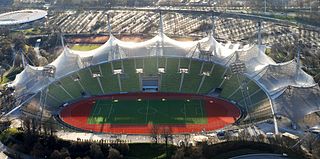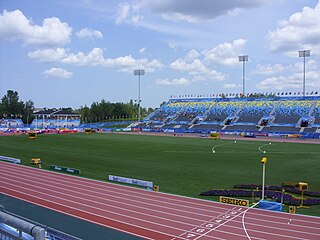
A stadium is a place or venue for (mostly) outdoor sports, concerts, or other events and consists of a field or stage either partly or completely surrounded by a tiered structure designed to allow spectators to stand or sit and view the event.

Arena AufSchalke, currently known as Veltins-Arena for sponsorship reasons, is an indoor football stadium in Gelsenkirchen, North Rhine-Westphalia, Germany. It opened on 13 August 2001, as the new home ground for Bundesliga club FC Schalke 04.

The Olympiastadion is a sports stadium at Olympiapark Berlin in Berlin, Germany. It was originally built by Werner March for the 1936 Summer Olympics. During the Olympics, the record attendance was thought to be over 100,000. Today the stadium is part of the Olympiapark Berlin.

Olympiastadion is a stadium located in Munich, Germany. Situated at the heart of the Olympiapark München in northern Munich, the stadium was built as the main venue for the 1972 Summer Olympics.
The bidding process for the 2018 and 2022 FIFA World Cups was the process by which the Fédération Internationale de Football Association (FIFA) selected locations for the 2018 and 2022 FIFA World Cups. The process began officially in March 2009; eleven bids from thirteen countries were received, including one which was withdrawn and one that was rejected before FIFA's executive committee voted in November 2010. Two of the remaining nine bids applied only to the 2022 World Cup, while the rest were initially applications for both. Over the course of the bidding, all non-European bids for the 2018 event were withdrawn, resulting in the exclusion of all European bids from consideration for the 2022 edition. By the time of the decision, bids for the 2018 World Cup included England, Russia, a joint bid from Belgium and Netherlands, and a joint bid from Portugal and Spain. Bids for the 2022 World Cup came from Australia, Japan, Qatar, South Korea, and the United States. Indonesia's bid was disqualified due to lack of governmental support, and Mexico withdrew its bid for financial reasons.

Khalifa International Stadium, also known as National Stadium, is a multi-purpose stadium in Doha, Qatar, as part of the Doha Sports City complex, which also includes Aspire Academy, Hamad Aquatic Centre, and the Aspire Tower. It is named after Khalifa bin Hamad Al Thani, Qatar's former Emir. The final of 2011 AFC Asian Cup was held at this stadium. The stadium is also the first completed venue that will host a part of the 2022 FIFA World Cup. In 2017, it received a four-star rating from the Global Sustainability Assessment System (GSAS), the first in the world to be awarded this rating.

Ahmed bin Ali Stadium, popularly known as the Al-Rayyan Stadium, is a multi-purpose stadium in Al Rayyan, Qatar, which is home to Al-Rayyan Sports Club and Al-Kharitiyath Sports Club. The stadium, built in 2003, had a seating capacity of 21,282.

The Thani bin Jassim Stadium, also known as the Al-Gharrafa Stadium, is a multi-purpose stadium in the Al Gharrafa district of Doha, Qatar. It is currently used mostly for football matches. Al-Gharrafa SC and Umm Salal SC play there. The stadium holds 21,175 people and was built in 2003. The stadium hosted 2011 AFC Asian Cup and other international competitions.

Croix-Bleue Medavie Stadium, formerly Moncton Stadium, is a track and field stadium on the campus of the Université de Moncton in Moncton, New Brunswick, Canada, built to host the IAAF 2010 World Junior Championships in Athletics. The $17 million venue opened in 2010. Although seating capacity had fluctuated early in construction, the stadium has 10,000 permanent seats, and is expandable to 20,725 via temporary seating. It is the home field for the Moncton Aigles Bleus soccer teams.

The 2022 FIFA World Cup is scheduled to be the 22nd edition of the FIFA World Cup, the quadrennial international men's football championship contested by the national teams of the member associations of FIFA. It is scheduled to take place in Qatar from 21 November to 18 December 2022. This will be the first World Cup ever to be held in the Arab world and the first in a Muslim-majority country. This will be the second World Cup held entirely in Asia after the 2002 tournament in South Korea and Japan. In addition, the tournament will be the last to involve 32 teams, with an increase to 48 teams scheduled for the 2026 tournament in the United States, Mexico, and Canada. The reigning World Cup champions are France.

Sport in Qatar is primarily centred on football in terms in participation and spectators. Additionally, athletics, basketball, handball, volleyball, camel racing, horse racing, cricket and swimming are also widely practised. There are currently eleven multi-sports clubs in the country, and seven single-sports clubs.

The Qatar 2022 FIFA World Cup bid was a bid by Qatar to host the 2022 FIFA World Cup. With a population of 2 million people, Qatar will be the first Arab state to host the World Cup. Sheikh Mohammed bin Hamad bin Khalifa Al-Thani, son of Hamad bin Khalifa Al Thani the then Emir of Qatar, was the chairman of the bid committee. Qatar promoted their hosting of the tournament as representing the Arab World, and has drawn support from across the member states of the Arab League. They also positioned their bid as an opportunity to bridge the gap between the Arab World and the West.

Neo Química Arena, previously known as Arena Corinthians, is a sports stadium located in São Paulo, Brazil, owned, operated and used by Corinthians. It has a seating capacity of 49,205, making it the fifth-largest stadium used by teams in the top tier of the Brazilian League and the eleventh-largest in Brazil.

This is a list of official football games played by Iran national football team between 2010 and 2019.

Lusail Iconic Stadium or Lusail National Stadium is a stadium under construction in Lusail, Qatar. Scheduled to open in May 2021, the new facility will host the final of the 2022 FIFA World Cup.

The Ekaterinburg Arena, officially Central Stadium, is a football stadium in the city of Yekaterinburg in Russia. It is the home ground of Russian Premier League and the country's oldest football club FC Ural Yekaterinburg. The capacity of the stadium is just over 35,000, and might be reduced to 25,000 after the 2023 Summer Universiade. It is one of 12 venues in 11 host cities for the 2018 FIFA World Cup in Russia. The stadium is the easternmost among the 2018 World Cup venues.

NUSSLI Group is an internationally operating group that is specialized in event, stadia and exhibition construction.
The awarding of the 2022 FIFA World Cup to Qatar created a number of concerns and controversies regarding both Qatar's suitability as a host country and the fairness of the Fédération Internationale de Football Association (FIFA) bidding process. Criticism from a number of media outlets, sporting experts, and human rights groups highlighted problems such as Qatar's limited football history, the high expected cost, the local climate, and Qatar's human rights record. There have been numerous allegations of bribery between the Qatar bid committee and FIFA members and executives. Several FIFA members have since gone on record saying that the decision to award the tournament to Qatar was a "mistake" which includes Theo Zwanziger and ex-president Sepp Blatter.

Al-Janoub Stadium, formerly known as Al-Wakrah Stadium, is a football stadium in Al-Wakrah, Qatar that was inaugurated on 16 May 2019. This is the second among the eight stadiums for the 2022 FIFA World Cup in Qatar, after the renovation of Khalifa International Stadium. It was designed by Iraqi-British architect Zaha Hadid together with the firm AECOM.
















